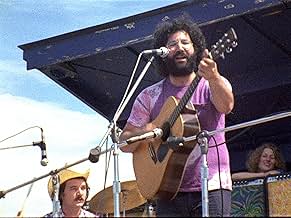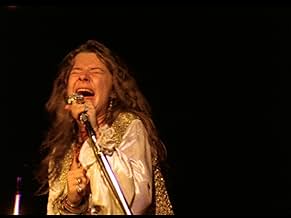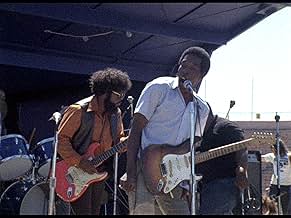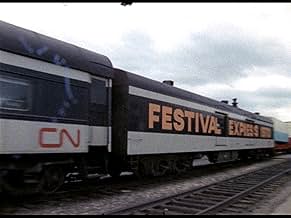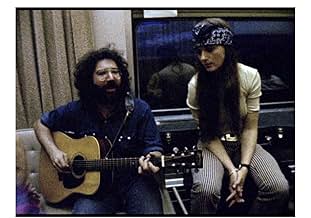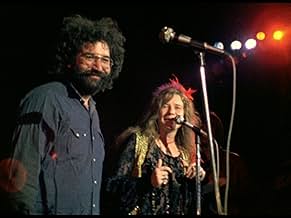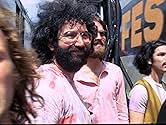AVALIAÇÃO DA IMDb
7,5/10
2,5 mil
SUA AVALIAÇÃO
Adicionar um enredo no seu idiomaThe filmed account of a large Canadian rock festival train tour boasting major acts like Janis Joplin, The Grateful Dead and The Band.The filmed account of a large Canadian rock festival train tour boasting major acts like Janis Joplin, The Grateful Dead and The Band.The filmed account of a large Canadian rock festival train tour boasting major acts like Janis Joplin, The Grateful Dead and The Band.
- Prêmios
- 1 vitória e 2 indicações no total
Janis Joplin
- Self - Janis Joplin & The Full Tilt Boogie Band
- (cenas de arquivo)
Grateful Dead
- Themselves
- (as The Grateful Dead)
Avaliações em destaque
9vdg
There is nothing more to add to the other commentaries: all you want at this end of the almost perfect documentary is MORE MUSIC!! Indeed I could see the same technique used by Pennebaker, and the same groove as in "Woodstock", but this is the closest you'll ever get in these modern times to a recreation of the flower-power atmosphere!! Today we have no more Janis, no more Jerry, and the whole world just feels empty without them, now even more than before, thanks to this movie. JANIS just steals the show every time she appears in the film, but there are many other people with memorable lines and comments, so in the whole it's an amazing feast for the eyes and ears! GO AND SEE IT
In the summer of 1970, some of the world's premier rock musicians - prime among them The Grateful Dead, The Band and Janis Joplin - got together to perform a series of concerts across southern Canada. Rather than just flying to the various venues then afterwards going their separate ways, the performers boarded a train in Toronto and headed west to Calgary, stopping off at various places to "do their thing" for appreciative audiences. That train ride, which turned into a nonstop jam session among some of the top rock 'n roll talents of the time, became known as the Festival Express and this film is the chronicle of that experience.
"Festival Express" juxtaposes footage of the event with present-day interviews from some of the people who were on that train. We see the musicians jamming together in the cars then performing their sets in open-air stadiums. What the film doesn't show us is any real interpersonal connection or interaction beyond the music. Perhaps the cameras were turned off whenever the performers were talking to one another, or, perhaps, the performers were just too drunk or stoned to say anything of any real interest to one another on the trip. Either way, the film does not provide us with a very compelling behind-the-scenes glimpse into the lives and personalities of these people. That is the biggest disappointment of the movie.
Be that as it may, "Festival Express" is still a useful time capsule for reminding us about what the culture was like 35 years ago. The film does an interesting job capturing the strange moral paradox that has been an intricate part of rock 'n' roll from its earliest days. For although rock music has always derived its power and strength from its anti-establishment stance and attitude, it is also a highly competitive business built on corporate interests, involving record companies, producers, promoters and millionaire performers. So how does one reconcile these two seemingly antithetical positions? How justify high ticket prices or millionaire salaries in an art form that claims as its foundational principle that the corporate establishment is the source of all the evil in the world and the very thing that the music itself is dedicated to stamping out? And how genuine can this anti-establishment attitude really be when what looks on the surface to be spontaneous rebellion is actually the result of shrewdly calculated Madison Avenue exploitation? This conundrum comes to a head in the Toronto stopover where a group of protesters outside the concert are threatening to turn violent if they aren't provided free entrance into the arena (the tickets cost a whopping $14!). These youngsters feel that, because rock claims to be a statement against everything related to money and profits, the purveyors of the message - i.e, the concert promoters and the rock stars themselves - should be willing to forego being paid for their efforts. There's humorous irony in the fact that we see these "radical" anti-establishment musicians ultimately siding with the cops on the issue and against their youthful fans on the outside! The people who were on the train keep telling us what a life-changing and euphoric experience that trip turned out to be. That may well be the case, but due to the lack of intimacy we feel with the performers, that sense doesn't really come across very effectively in the film. What the film does provide is a rare opportunity to watch a collection of iconic rock legends performing at the peak of their youth and powers. That alone is what makes "Festival Express" a must-see for aficionados.
"Festival Express" juxtaposes footage of the event with present-day interviews from some of the people who were on that train. We see the musicians jamming together in the cars then performing their sets in open-air stadiums. What the film doesn't show us is any real interpersonal connection or interaction beyond the music. Perhaps the cameras were turned off whenever the performers were talking to one another, or, perhaps, the performers were just too drunk or stoned to say anything of any real interest to one another on the trip. Either way, the film does not provide us with a very compelling behind-the-scenes glimpse into the lives and personalities of these people. That is the biggest disappointment of the movie.
Be that as it may, "Festival Express" is still a useful time capsule for reminding us about what the culture was like 35 years ago. The film does an interesting job capturing the strange moral paradox that has been an intricate part of rock 'n' roll from its earliest days. For although rock music has always derived its power and strength from its anti-establishment stance and attitude, it is also a highly competitive business built on corporate interests, involving record companies, producers, promoters and millionaire performers. So how does one reconcile these two seemingly antithetical positions? How justify high ticket prices or millionaire salaries in an art form that claims as its foundational principle that the corporate establishment is the source of all the evil in the world and the very thing that the music itself is dedicated to stamping out? And how genuine can this anti-establishment attitude really be when what looks on the surface to be spontaneous rebellion is actually the result of shrewdly calculated Madison Avenue exploitation? This conundrum comes to a head in the Toronto stopover where a group of protesters outside the concert are threatening to turn violent if they aren't provided free entrance into the arena (the tickets cost a whopping $14!). These youngsters feel that, because rock claims to be a statement against everything related to money and profits, the purveyors of the message - i.e, the concert promoters and the rock stars themselves - should be willing to forego being paid for their efforts. There's humorous irony in the fact that we see these "radical" anti-establishment musicians ultimately siding with the cops on the issue and against their youthful fans on the outside! The people who were on the train keep telling us what a life-changing and euphoric experience that trip turned out to be. That may well be the case, but due to the lack of intimacy we feel with the performers, that sense doesn't really come across very effectively in the film. What the film does provide is a rare opportunity to watch a collection of iconic rock legends performing at the peak of their youth and powers. That alone is what makes "Festival Express" a must-see for aficionados.
I recommend this film not only because I am a fan of most of the people that gave performances, but the creator of the film captured footage of the performers that was exceptionally good. The "young" Grateful Dead gave a tighter performance than I had ever seen them perform live. "The Band" also surprised me. They performed very well and they too seemed tighter than when I saw them live 30-plus years ago. However, Janis stole the show. She was wonderful! You must see the movie just for her performances alone. What a trip! The in between shots of all the musicians riding on the train was fun and full of energy and a real bonus to the film (the concert footage was enough to bring me in to see the movie). If you are a fan of the 60's and you enjoy Janis Joplin and the Grateful Dead, you must see this film. The only time I felt disappointed was when the movie ended. I could easily have watched two or three more hours of concert footage.
I was there at the Toronto performance(s). I was inside the venue all the time and never got to see any of the hassle with the cops and the gate crashers. The first time I saw it was in this film. I must say, Altamont it was not.
I was fairly well connected from working on the fringe of the music business in Toronto at the time and I knew some of the people who were on the tour. I would have given my left arm to have been on that train but it wasn't to be.
Let me tell you... this film just comes close - but no cigar - to how it REALLY was like to be there as it happened. The performances were, for the most part, electrifying and I can confidently assure you that the audience(s) had about as good a time as the performers!
I had been exposed to the "California contingent" which was on the tour years earlier in 1967 when I was living in Berkely and hanging out at the Avalon and the Filmore. I got to see the Dead and Janice before anyone had heard of them outside of California. This tour and this film caught them at their best as far as I'm concerned. Janice and the band were KILLER! Her set alone is worth the price of the DVD.
Watching this film was, for me, like going through a time-warp and being transported back to a more carefree time when I was minus wife, kids, mortgage,etc.
Although the production values aren't up to today's Hollywood snuff, considering what the producers had to work with, that they got it this polished is miraculous. I especially liked that the producers rounded up a number of the participants to interview them and get their take on it from over thirty years later.
The only significant down-side from my point of view is that some of the performers who appeared on the tour were not in the film and, in my opinion, their performances were no less worthy of inclusion. Some of the "travelogue" shots in the film could have been dumped to make more room for the music. I suppose that certain rights issues and technical quality issues were a barrier.
Anybody who has a warm spot in their heart for the music, the bands and the ethos of that era MUST add this DVD to their collection.
I was fairly well connected from working on the fringe of the music business in Toronto at the time and I knew some of the people who were on the tour. I would have given my left arm to have been on that train but it wasn't to be.
Let me tell you... this film just comes close - but no cigar - to how it REALLY was like to be there as it happened. The performances were, for the most part, electrifying and I can confidently assure you that the audience(s) had about as good a time as the performers!
I had been exposed to the "California contingent" which was on the tour years earlier in 1967 when I was living in Berkely and hanging out at the Avalon and the Filmore. I got to see the Dead and Janice before anyone had heard of them outside of California. This tour and this film caught them at their best as far as I'm concerned. Janice and the band were KILLER! Her set alone is worth the price of the DVD.
Watching this film was, for me, like going through a time-warp and being transported back to a more carefree time when I was minus wife, kids, mortgage,etc.
Although the production values aren't up to today's Hollywood snuff, considering what the producers had to work with, that they got it this polished is miraculous. I especially liked that the producers rounded up a number of the participants to interview them and get their take on it from over thirty years later.
The only significant down-side from my point of view is that some of the performers who appeared on the tour were not in the film and, in my opinion, their performances were no less worthy of inclusion. Some of the "travelogue" shots in the film could have been dumped to make more room for the music. I suppose that certain rights issues and technical quality issues were a barrier.
Anybody who has a warm spot in their heart for the music, the bands and the ethos of that era MUST add this DVD to their collection.
Oh . . . My . . . God!
Yer gonna die! 33 years from filming to the screen. But here it is!
If you like The Grateful Dead, Janis Joplin, The Band, and/or that era, A) you're gonna Love this, and B) as a documentary of the time this is rivaled only by Woodstock.
In fact, there's a quote by some musician in the film about: "Woodstock was a treat for the audience; the Festival Express was a treat for the performers." Apparently it was a non-stop jam session & party from beginning to end. Buddy Guy jokes, "I couldn't go to sleep cuz I thought I'd miss something!" The Grateful Dead's lyricist Robert Hunter later wrote a song about it -- "Never had such a good time in my life before / I'd like to have it one time more." And Janis says at the last show, "Next time you throw a train, man, call me."
This was a rock festival "tour" across Canada in the summer of 1970. The idea was to create Multiple mini-Woodstocks by having a train take all the bands to the next site. They ended up pulling off three of them - in Toronto, Winnipeg, and Calgary. But this being Canada in the last century, there's only like 5 or 10,000 people in the Peg and Cowtown!
The guy who was in charge of filming it back then told me they had 5 cameramen and a total crew of about 20. There was apparently a dispute over who owned the film, resulting in all this great footage never being seen, and reminding me of the similar squabbles over that other great cinema verite classic Pull My Daisy by Robert Frank. Both Daisy and this Express really document their respective peaks in creative history vibrantly & honestly, showing both the crazy drunken joyride and the brilliant peaks of pure channeled genius.
Other films in this chapter would include Monterey Pop, The Last Days of The Fillmore, Big Sur, then The Last Waltz a few years later. They sometimes use split-screens to show both the audience and the performers, and apparently the director who finally turned the footage into a film also did the Beatles Anthology, so it's kind of like that - all this historic footage interspersed with new interview snippets by the various participants, like Bob Weir remembering, "Most all of us were new to drinking at that point. We'd all been taking LSD or smoking pot or whatever, but this was a whole new experience for us!" Ah, Canada!
And talk about Big Railroad Booze -- there's a hilarious part where they run out in Saskatchewan: CN Conductor: They drank us dry! Promoter: When's the next stop? Conductor: We're not scheduled for a stop. Promoter: You are now.
Then Eric Andersen looking back, shakin his head, "I dunno, they just stopped in Saskatoon, the whole damn train stopped, like, In Front of a liquor store!"
It's one of those movies where you're laughing so hard you miss stuff, or you're so busy watching Rick Danko you forget Janis and Jerry are beside him. It's filled with so many glistening gold treasures you're gonna come away richer just watching it. Masters channeling some force beyond . . . makes me think of people I've met who don't believe there's a God of any kind, no larger spiritual anything. This movie sure reinforced for me that there's Some spirit force out there, and Rick Danko and Janis and Richard Manuel are channeling it right before your eyes!
And Deadheads are gonna freak! There are 3 songs by the original 6-member band, but more importantly, Jerry Garcia is really shown in his prime. Not only is he central to seemingly every train-car jam, but when there's trouble with the crowds in Toronto, it's Garcia who comes to the microphone to plead for "coolness". I believe it's the new Dennis McNally book on the Dead that says Garcia learned their eventual staple Goin' Down The Road Feelin' Bad from Delaney & Bonnie on this trip, and you actually see Delaney playing it on the train at one point.
Janis is so possessed & clearly channeling The Big Guy to close the final show of the tour and the film, it's so sad this lifeforce died accidentally just 2 months later. People were literally crying in the theater at her performance. I mean, the audience was so captivated, they broke out in applause Mid-song when she came back from her spontaneous stage rap to nail Cry Baby at the Winnipeg show.
And this is by far the loosest and rockingest original Band I've ever seen or heard. The Last Waltz is of course white hot, but they're polished to perfection. This is The Band of the Basement Tapes, except playing in their home country and even more electrified - they're hanging with the Dead on the road, not Dylan in a basement :-) It's the kind of stuff you always wished you saw or were there for. Now, Bing!
I caught it at the Toronto Film Festival (Sept. '03) and sure hope for everyone's sake this finds wide distribution, then an excellent DVD avec outtakes comes out!
Yer gonna die! 33 years from filming to the screen. But here it is!
If you like The Grateful Dead, Janis Joplin, The Band, and/or that era, A) you're gonna Love this, and B) as a documentary of the time this is rivaled only by Woodstock.
In fact, there's a quote by some musician in the film about: "Woodstock was a treat for the audience; the Festival Express was a treat for the performers." Apparently it was a non-stop jam session & party from beginning to end. Buddy Guy jokes, "I couldn't go to sleep cuz I thought I'd miss something!" The Grateful Dead's lyricist Robert Hunter later wrote a song about it -- "Never had such a good time in my life before / I'd like to have it one time more." And Janis says at the last show, "Next time you throw a train, man, call me."
This was a rock festival "tour" across Canada in the summer of 1970. The idea was to create Multiple mini-Woodstocks by having a train take all the bands to the next site. They ended up pulling off three of them - in Toronto, Winnipeg, and Calgary. But this being Canada in the last century, there's only like 5 or 10,000 people in the Peg and Cowtown!
The guy who was in charge of filming it back then told me they had 5 cameramen and a total crew of about 20. There was apparently a dispute over who owned the film, resulting in all this great footage never being seen, and reminding me of the similar squabbles over that other great cinema verite classic Pull My Daisy by Robert Frank. Both Daisy and this Express really document their respective peaks in creative history vibrantly & honestly, showing both the crazy drunken joyride and the brilliant peaks of pure channeled genius.
Other films in this chapter would include Monterey Pop, The Last Days of The Fillmore, Big Sur, then The Last Waltz a few years later. They sometimes use split-screens to show both the audience and the performers, and apparently the director who finally turned the footage into a film also did the Beatles Anthology, so it's kind of like that - all this historic footage interspersed with new interview snippets by the various participants, like Bob Weir remembering, "Most all of us were new to drinking at that point. We'd all been taking LSD or smoking pot or whatever, but this was a whole new experience for us!" Ah, Canada!
And talk about Big Railroad Booze -- there's a hilarious part where they run out in Saskatchewan: CN Conductor: They drank us dry! Promoter: When's the next stop? Conductor: We're not scheduled for a stop. Promoter: You are now.
Then Eric Andersen looking back, shakin his head, "I dunno, they just stopped in Saskatoon, the whole damn train stopped, like, In Front of a liquor store!"
It's one of those movies where you're laughing so hard you miss stuff, or you're so busy watching Rick Danko you forget Janis and Jerry are beside him. It's filled with so many glistening gold treasures you're gonna come away richer just watching it. Masters channeling some force beyond . . . makes me think of people I've met who don't believe there's a God of any kind, no larger spiritual anything. This movie sure reinforced for me that there's Some spirit force out there, and Rick Danko and Janis and Richard Manuel are channeling it right before your eyes!
And Deadheads are gonna freak! There are 3 songs by the original 6-member band, but more importantly, Jerry Garcia is really shown in his prime. Not only is he central to seemingly every train-car jam, but when there's trouble with the crowds in Toronto, it's Garcia who comes to the microphone to plead for "coolness". I believe it's the new Dennis McNally book on the Dead that says Garcia learned their eventual staple Goin' Down The Road Feelin' Bad from Delaney & Bonnie on this trip, and you actually see Delaney playing it on the train at one point.
Janis is so possessed & clearly channeling The Big Guy to close the final show of the tour and the film, it's so sad this lifeforce died accidentally just 2 months later. People were literally crying in the theater at her performance. I mean, the audience was so captivated, they broke out in applause Mid-song when she came back from her spontaneous stage rap to nail Cry Baby at the Winnipeg show.
And this is by far the loosest and rockingest original Band I've ever seen or heard. The Last Waltz is of course white hot, but they're polished to perfection. This is The Band of the Basement Tapes, except playing in their home country and even more electrified - they're hanging with the Dead on the road, not Dylan in a basement :-) It's the kind of stuff you always wished you saw or were there for. Now, Bing!
I caught it at the Toronto Film Festival (Sept. '03) and sure hope for everyone's sake this finds wide distribution, then an excellent DVD avec outtakes comes out!
Você sabia?
- CuriosidadesThere were two bands, Traffic and Ten Years After, that were on the Festival Express tour but are not seen in the movie. The producers of the film could not get the musical rights.
- Citações
Self - Interviewee: [promoter] We're going to get a whole bunch of acts together and do a big festival. And rather than do it at one site, I said, we're gonna travel the country on a private train.
- Trilhas sonorasCasey Jones
From the Album "Workingman's Dead"
Performed by Grateful Dead
Written by Jerry Garcia (as J. Garcia) / Robert Hunter (as R. Hunter)
Published by Ice Nine Publishing Company, Inc.
Courtesy of Warner Bros. Records Inc.
by arrangement with Warner Strategic Marketing
Principais escolhas
Faça login para avaliar e ver a lista de recomendações personalizadas
- How long is Festival Express?Fornecido pela Alexa
Detalhes
- Data de lançamento
- Países de origem
- Central de atendimento oficial
- Idioma
- Também conhecido como
- Фестивальный экспресс
- Locações de filme
- Empresas de produção
- Consulte mais créditos da empresa na IMDbPro
Bilheteria
- Faturamento bruto nos EUA e Canadá
- US$ 1.174.079
- Fim de semana de estreia nos EUA e Canadá
- US$ 12.074
- 25 de jul. de 2004
- Faturamento bruto mundial
- US$ 1.281.754
- Tempo de duração1 hora 30 minutos
- Cor
- Mixagem de som
- Proporção
- 1.85 : 1
Contribua para esta página
Sugerir uma alteração ou adicionar conteúdo ausente

Principal brecha
By what name was Festival Express (2003) officially released in India in English?
Responda

